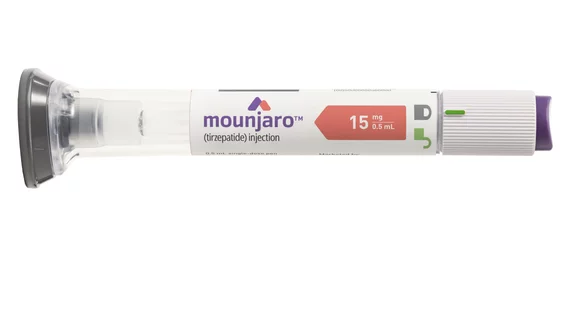FDA grants fast track designation to tirzepatide, Eli Lilly’s new type 2 diabetes drug, for treating obesity
Tirzepatide, a once-weekly injectable dual glucose-dependent insulinotropic polypeptide (GIP) and glucagon-like peptide receptor agonist (GLP-1) sold by Eli Lilly and Company under the name Mounjaro, may soon be approved by the U.S. Food and Drug Administration as a treatment option for obesity.
In May, tirzepatide was approved by the FDA for improving glycemic control among adults with type 2 diabetes. Now, the medication has received the agency’s fast track designation for treating obese patients or overweight patients with weight-related comorbidities. The FDA uses this designation to speed up the approval process for certain medications that have shown the potential to treat serious health conditions or fill an unmet medical need.
“Obesity is a chronic disease that impacts the health of nearly 100 million Americans and is a significant driver of healthcare costs,” Mike Mason, president of Lilly’s diabetes business, said in a prepared statement. “While diet and exercise are important steps, most patients don't achieve their desired treatment goals with only diet and exercise.”
Lilly plans to begin the process of submitting a rolling new drug application for this indication soon. The final submission will focus on data from two key clinical trials, SURMOUNT-1 and SURMOUNT-2. The results of SURMOUNT-1 were published in the New England Journal of Medicine in June—three different doses of tirzepatide was associated with “substantial and sustained reductions in body weight” at the end of the 72-week trial.[1] SURMOUNT-2, a separate 72-week study, is expected to be complete in April 2023.
In February, Cleveland Clinic included tirzepatide in its list of the top 10 medical innovations expected to make a big impact on patient care in 2022.
According to Lilly, serious side effects associated with tirzepatide may include pancreatitis, hypoglycemia, serious allergic reactions, kidney issues, severe stomach issues, changes in vision and gallbladder issues. The most common side effects are nausea, diarrhea, decreased appetite, vomiting, constipation, indigestion and stomach (abdominal) pain.

